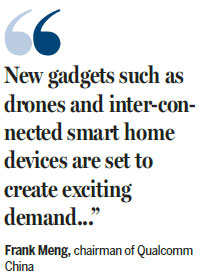
Frank Meng wants to ensure Qualcomm China seizes 'opportunities that do not even exist today'
If seven out of ten smartphones sold worldwide last year were assembled in China, much credit for that should probably go to the China arm of US chipmaker Qualcomm. Thanks to its famed processors such as the Snapdragon, Qualcomm emerged as the world's biggest chip supplier to smartphone companies.
But Frank Meng, 56 years old, the soft-spoken chairman of Qualcomm China, is not an executive who will rest content with past achievements. His mind is focused on things futuristic.
"I love to deal with challenges," he told reporters at the first public event after taking over as chairman of Qualcomm China in mid-2015.
And, in an exclusive chat with China Daily, Meng said Qualcomm will step up its investments in China. For, the country is entering the age of the Internet of Things, which will see billions of computers, gadgets, appliances, furniture, machines and vehicles inter-connected in real time via the Internet.
"Well, 'keep investing in China' has been a major strategy for us. Qualcomm will work with its Chinese partners to seize opportunities that do not even exist today."
By that he means making super-efficient chips for, besides the Internet of Things, servers and a new class of vehicles like drones.
Decades of experience in China's information technology industry, Meng said, helps him to instinctively sense what the next big thing could be. "New gadgets such as drones and inter-connected smart home devices are set to create exciting demand just as smartphones did a few years ago."

Meng is excited that the Chinese tech industry is ready for the new era, which will be marked by "China-centric" and "China-first" opportunities. Local innovations in consumer electronics will drive growth, said Meng.
The telecom veteran loves to compare today's market conditions with those that existed a decade back. After all, past experiences unveil tomorrow's trends, he said.
"About 30 years ago, Japan used to lead growth of camera and other consumer electronics because of its huge domestic demand. China is at a similar flashpoint now. The market cannot just wait for technology breakthroughs imported by overseas companies. Instead, local players are coming up with gigantic amount of ideas that suit Chinese customers' requirement."
In terms of innovation, Qualcomm has always been keeping pace with Chinese tech firms, Meng said. The US company's local arm set up a research and development team in China to support its Chinese customers.
That is one of the high points of his second stint with Qualcomm China. During his first stint from 2003 to 2010, he served as Qualcomm China's president, and led the company into major deals with Chinese hardware manufacturers.
During that period, Qualcomm became one of the biggest suppliers of CDMA chipsets, a mainstream 3G technology used in China. "Chinese vendors started to export 3G phones in 2005. We thought it was a great opportunity for us to fuel the trend."
Qualcomm offered a wider-tiered product portfolio than Taiwan-based competitors such as MediaTek Inc. That helped Chinese smartphone manufacturers to boost their sales manifold over the last decade, as demand for 3G and 4G devices soared.
For its part, to reinforce its commitment to the China market, Qualcomm pledged a $150-million venture investment fund, to support Chinese startups in areas such as Internet, e-commerce, semi-conductors and health.
The US company was also one of the earliest investors in Xiaomi.
Around the time Meng returned to the company, a Qualcomm affiliate formed a joint venture with Semiconductor Manufacturing International Corp, the largest chip foundry in China together with Huawei Technologies Co Ltd, a telecom equipment maker, and imec, one of the world's leading nano-electronics research and development centers, to develop the next-generation integrated circuits.
Industry research firm IDC said joint ventures with local players could be an efficient way for overseas tech companies such as Qualcomm to penetrate the Chinese market further in coming years.
To prepare for the future, Meng-led Qualcomm China announced another JV in late January, this time with Southwest China's Guizhou province, to develop and manufacture server chips.
Qualcomm took a 45 percent stake in the 1.85-billion-yuan ($280-million) joint venture, while the rest was held by the investment arm of the Guizhou provincial government.
Xu Shaoshi, head of the National Development and Reform Commission, the country's top economic planner, said cross-border technological innovation will play a key role in China's economic growth. "China welcomes foreign investment (in the IT sector)," Xu said.
According to the Ministry of Industry and Information Technology, the Chinese IT manufacturing segment grew by a healthy 10.5 percent year-on-year in December 2015. The ministry said IT will drive growth as the export-oriented manufacturing sector continues to wither. Meng is confident China is a huge market where domestic consumption of electronics is set to grow.
gaoyuan@chinadaily.com.cn

CLOSE-UP
Frank Meng
Chairman, Qualcomm China
Born in 1960 in Beijing
Career:
2003-10: President, Qualcomm China
2010-13: Vice-president, Motorola Mobility
2013-15: President, 21Vianet Group
2015-to present: Chairman of Qualcomm China
Education:
1982: Bachelor's degree in microwave and fiber optic communications, the Beijing University of Posts and Telecommunications.
1987: Master's degree in electrical engineering, the Polytechnic University of New York.